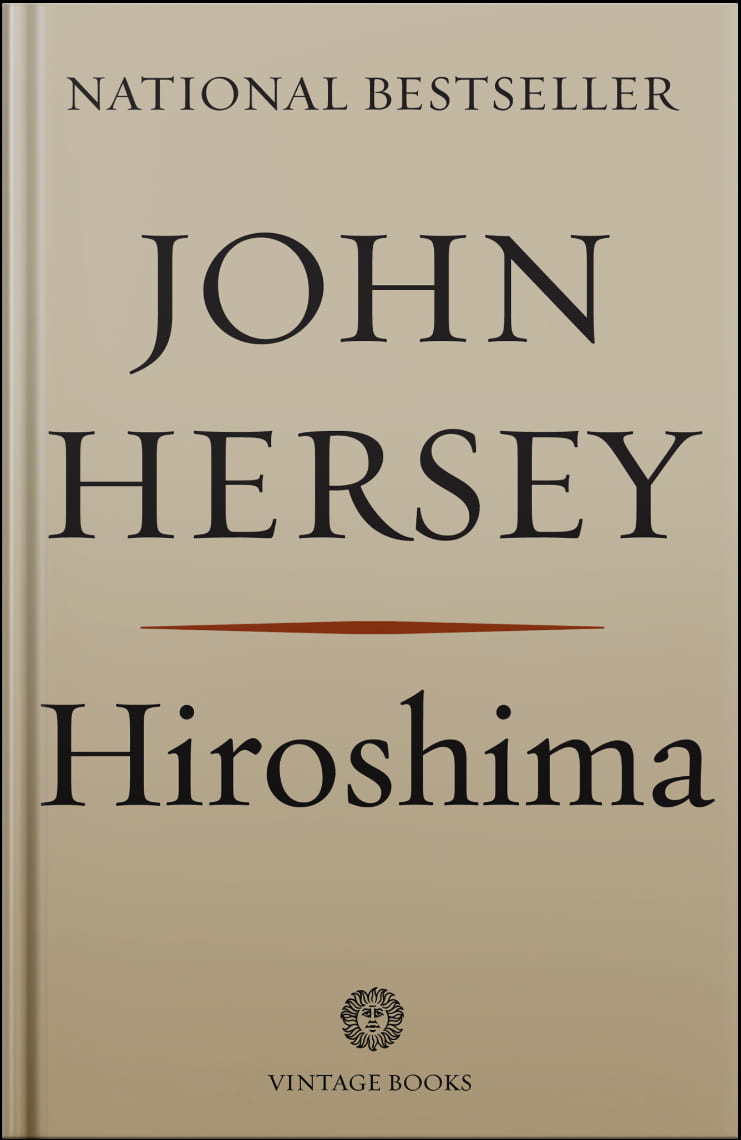Many people know about the Hiroshima incident at the end of WW2 where the atomic bomb was dropped on Japan. Today we will be talking about a book that follows the stories of 6 survivors of that incident, called, “Hiroshima” by John Hersey.

I will spare you the details but if you are interested in the book I would recommend reading it. Today though, is a critique of the book itself. The book was first released as a news paper in America, published by the New York Times. However, in the current book, only the first 4 chapters were part of the newspaper addition. The 5th and final chapter was added when Hersey went back 40 years later to interview the same 6 people. As such, it has a very different tone and style that it follows. This being the case, you may see me talking about the 2 differently.
Historically speaking the book was one of the first accounts of the Hiroshima bombing in such a blunt way. People at the time were celebrating because the war was over. So, they weren’t used to the bomb that ended the war to be painted in such a negative light. In the first 2 chapters there were a lot of lines like “their faces wholly burned, their eye sockets were hollow, the fluid from their melted eyes had run down their cheeks” or “her hand came off in glove like pieces”. These lines helped to set the mood and also made the reader think about the effects of the bomb. Due to the lines being so direct, one can imagine how western countries who read the paper must have reacted. At the time there were a lot of media coming out that supported the power of the nuclear weapon. Media such as:
Add link
Or even in children’s toys like:

So seeing how the atom bomb was depicted you can see why this book is so popular. Hersey used lines such as “man is not now in the state god intended, he has fallen from grace through sin” a quote from Father Kleinsorge or “there was so much unavoidable destruction” to depict the bomb as a bad thing that causes death and destruction. Even in the last chapter Hersey includes statistics like “In October 1952, Great Britain conducted its first test of an atomic bomb and the United States its first of a hydrogen bomb. In August 1953, the Soviet Union also tested a hydrogen bomb.” to show that we didn’t learn from our history. We continued to create these powerful weapons during the Cold War and now we have enough to destroy the earth several times over.
There is a simulation to do that here.
Considering that the book was written based on interviews with these 6 people we have to question the accuracy of the stories. There are a lot of times in traumatic events where we miss things we would normally catch, we fill in the gaps, or we think something is worse than it is. In the book lines such as “A first aid kit was hanging undisturbed on a hook on the wall” and “His desk was in splinters but a mere papier-mâché suitcase, which was hidden under the desk, stood handle-side up, without a scratch on it, in the doorway of the room, where he could not miss it” are things we can question. We can’t say that they actually did or saw this or if it really was the only unaffected thing in the room is questionable. Things that we can say for sure also go back to Hersey. He did interview them so he got to see them face to face. Hersey knows for a fact that Ms. Sasaki’s leg is shrunken, or that Me. Tanimoto lives in a snug house with 2 television sets and has added things on his own to help the tone of the story. Using words like “snug” to be descriptive.
We went through a lot today but I’m sure there are things that I missed or chose not to talk about. I decided to critique this book from a historical point of view in terms of accuracy but that’s not the only way I could have tackled this. If you are interested to see other critiques of Hiroshima then check out Kaia’s post or Thomas’s post. Should you read this book keep in mind some of the things you read here today. I personally enjoyed the fact that Hersey didn’t sugarcoat things but if you have a weak stomach I would warn you that he can be quite graphic. See you guys next time.
